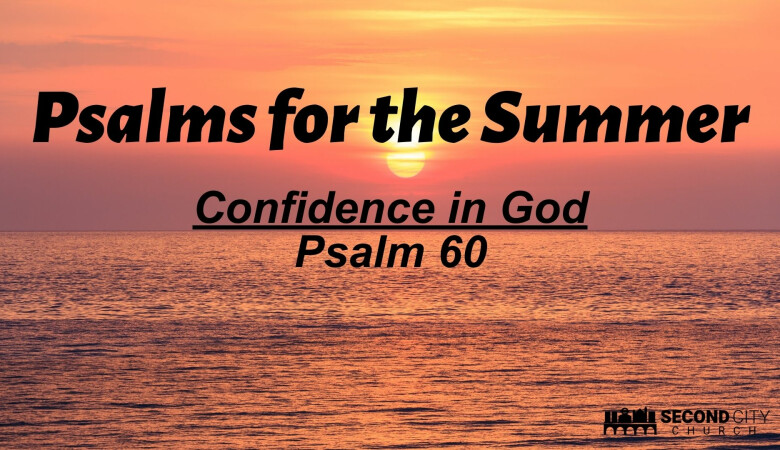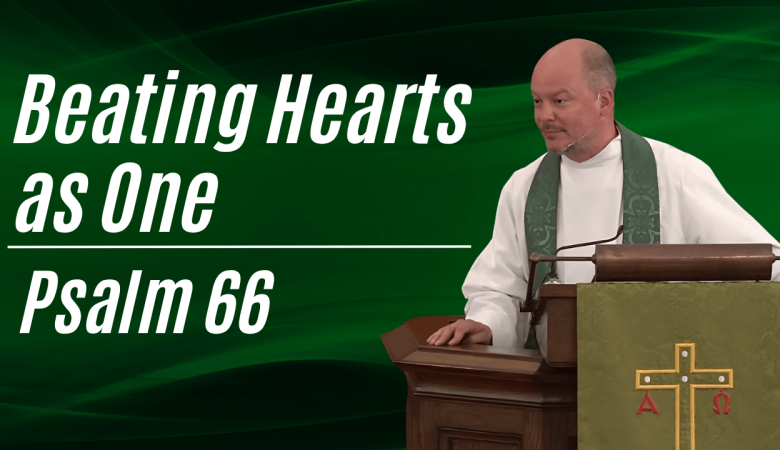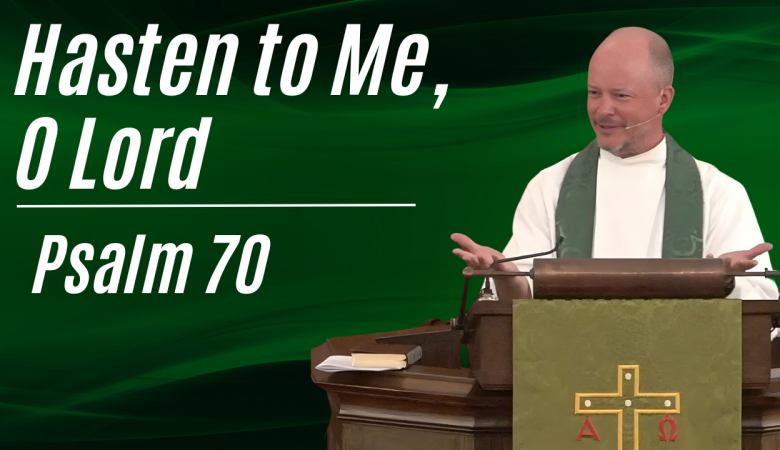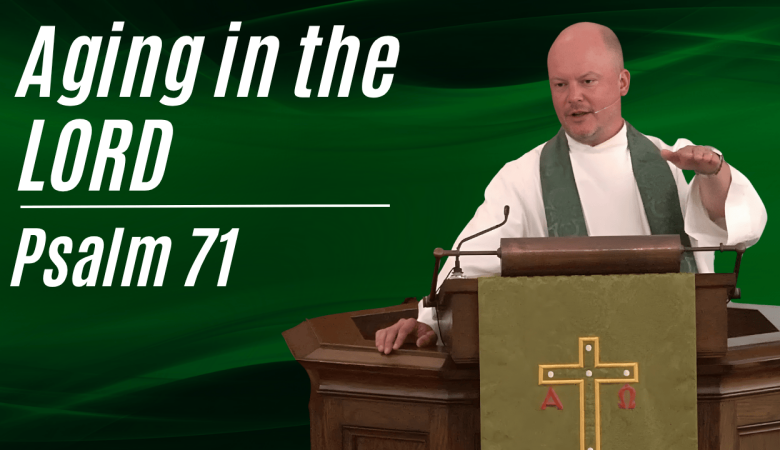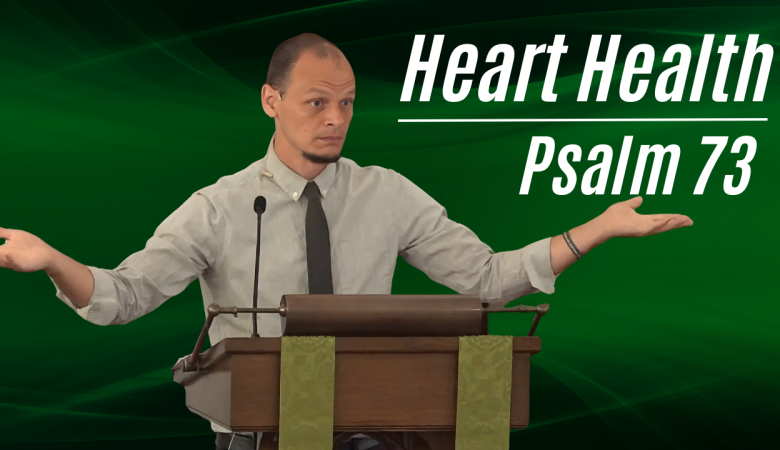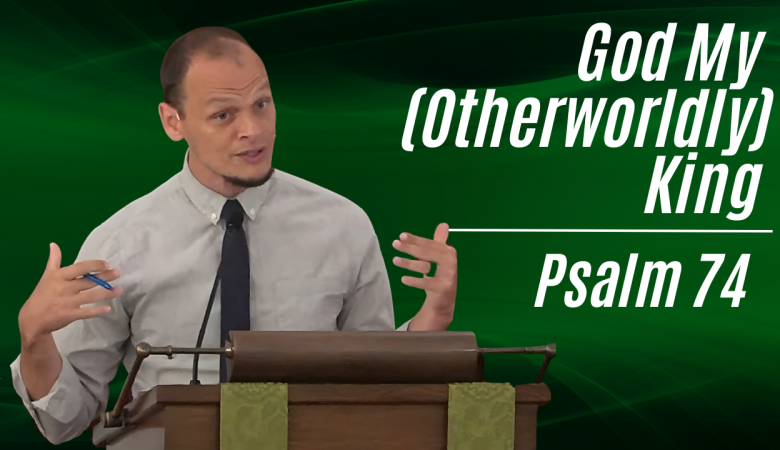Series: Psalms for the Summer
Drinking the Cup
August 24, 2025 | Peter Rowan
Passage: Psalms 75:1-10
Summary
When we think about judgment, especially God's judgment, our first reaction is rarely celebration. Yet Psalm 75 begins with thanksgiving, celebrating rather than dreading God's judgment. This surprising perspective invites us to reconsider what divine judgment truly means and accomplishes.There are three compelling reasons to celebrate God's judgment. First, it promises an end to evil—from historical tyrants like Pharaoh and Hitler to everyday injustices in our neighborhoods and schools. Deep down, we all want evil to stop, and God's judgment guarantees exactly that. Second, while humans are terrible judges—biased, shortsighted, and hypocritical—God alone judges with perfect knowledge and justice. Finally, and most profoundly, Christ has taken God's judgment upon himself. In the Garden of Gethsemane, Jesus agreed to drink the cup of God's wrath meant for us, similar to how the Passover lamb's blood caused judgment to 'pass over' the Israelites.This understanding transforms God's judgment from something to fear into something to celebrate. It's not about feeling superior to others, but recognizing that evil will not have the final word, that justice will come from a perfect judge, and that through Christ, we can experience grace rather than condemnation. Like the organization 'Christ for Kentucky' buying and abolishing medical debt, Christ has paid our spiritual debt in full, offering us freedom instead of judgment.
Transcript
Anyway, we're in Psalm 75. This will be the last one for this year, and then we will pick it up again next year. One of the things that Christians stand up and confess and one of the things that we as a church stand up and confess week in, week out is that Jesus returning to judge the living and the dead.
And I would guess that there are those of you here this morning who may not buy into the whole Jesus is God conquering the cross, Satan, sin and death risen from the dead, all that kind of stuff, or all the rest of Christianity. And as soon as I say, yeah, Jesus coming to judge, this is what you're thinking? Yeah, this is one of the reasons. This is one of the reasons why Christianity is not me so unappealing. Right there, the core of your faith. That core kind of. This is creed of Christianity, judgment. No, thanks.
And maybe if you're a Christian and the whole judgment of God thing is also maybe off putting you, maybe it recalls here in memory times where judgment has been present, rendered on you. Maybe Jesus showing up as judge at the great day of the Lord maybe evokes in you those memories of the nightmares when you showed up to class with no pants on. Or maybe one of the ones that I've had these past 15 years since I've been an ordained pastor, showing up to worship and nobody else comes. Or worse, showing up and having no idea what I'm talking. And you all know that I have no idea what I'm talking about. And like, one by one, you all leave. I'm telling you, I've had that nightmare more than a few times.
Truth is, the judgment of God doesn't elicit the warmest feelings.
Many of us, we're taking this Psalm, Psalm 75, that it's of Asaph. And as I said a couple weeks back, most of these psalms in this third book of the Psalms, they're related to worshiping God in the temple, the guided worship of God's people. This one it says, is to the choir master. And then at the end, at that little title, it says, it says song. Everybody's supposed to sing this one together.
And this one is sung to one of my favorite tunes, do not destroy. There are other tunes that have other psalms that have titles to them, tunes that they're supposed to be sung to. Psalm 80 in 5 Psalms from now is supposed to be sung according to the lilies. Psalm 88 is according to Mahalan Leonov, which I am fairly certain is an Elvish tune from Middle Earth. I. I don't Know, anyway, this one's do not Destroy, which is, as I said before, almost certainly a heavy metal screamo tune. Do not destroy. That kind of thing.
That's what I do sometimes. Really interesting that this is a psalm about judgment, and the tune is do not distort them.
But here's the thing, right? As much as the pushback that we give, from the emotional pushback at the very least, and sometimes intellectual pushback to that, to the doctrine of judgment of God. Did you notice this song? Celebrate. Celebrate.
If you have that Bible open still, Psalm 75, you can look down with me at verse one, and this is how it reads. We give thanks to you, O God. We give thanks for your name is near. We recount your wondrous deeds. When God comes near. When the day of the Lord happens, which, by the way, does have an ultimate day of the Lord, the coming judgment and the return of Christ. But the day of the Lord is something that happens throughout. There's different days of the Lord in the Bible, but when God comes close, they give thanks.
When we think of God, Christ himself coming near, judging the living and the dead, we give thanks. And I know, my guess is some of you are like, I don't know. I don't normally do that. That's not the general impulse when I think of that. And so today I want us to look at this text, and I want to suggest a few reasons why it's right, give thanks. The context of the church, judgment of God. Okay? So the first reason that I think that you. You brought a good thanks for judgment of God was you do not want evil. You don't want evil.
Yesterday, couple days ago, I was with my kids. I was away from home, and our little dog Teddy is barking like crazy, and Lisa is upstairs, and Teddy doesn't normally just bark like crazy. You've been to our house, many of you, and you know that he barks, but not like. And he's doing that kind of thing. And so malice goes downstairs and she looks out the window and literally, like, directly in front of our house, right? Like, we've got a little tiny, you know, front porch, and then there's three stairs. And right this. Right here at the front stairs, there's two guys getting arrested, you know, like. Right. Which, you know, I don't know what they were getting arrested for. People sometimes get arrested at times how they didn't do it, they were being arrested for. That's all true. But let me tell you, if it's unsettling to have somebody rested directly in Front of your house, Ryan. We desire safe neighborhoods. Right? You desire safe neighborhoods. You do not want evil in this city, do you? No, you do not.
This spring, Melissa and I were at a wedding with a good friend in Kentucky. And the minister who officiated the wedding is somebody I went to seminary with at Covenant Seminary. I was talking to him about what he's doing now because he's not working in the context of the local church. He works for an organization that he heads called Christ for Kentucky, which he says is for the good of the bluegrass, bringing the gospel to a bluegrass state. And I said, well, what does that mean you do? Right. It felt nebulous a little bit.
And of course, they do quite a lot of things. But one of the things that he shared with me that they're doing is that they are working to eliminate medical debt in Kentucky. You might know this medical debt is unbelievably crippling for so many. It's actually medical debt is so crippling. What was the number I read in Appalachia, one third of the population has medical debt. That is considered crippling debt. Okay. So what happens is that they're not able to pay, and the healthcare providers that are billing them know they can't pay. And so they can get some of their money recouped from the work they did by selling some of that debt to credit creditors. And so they sell a massively discounted fee. Something. I want to say it was 0.5% of the actual number, but it might have been 1%. I forget. And so these collections agencies, they get all this debt and they can put liens on their households, they can garnish wages. And there's all this, even what's taking place. And the amount of bankruptcy is actually the number one reason for bankruptcy, personal bankruptcy is medical debt. And so their organization is seeking to fight this. And one of. One of the things that's happening here is this is simply an evil thing, evil thing taking place. And you want people to stop, and I want you to stop. And thankfully, my friend and others in Kentucky want people to stop.
Look at the inside cover of the bulletin with me. There's a quote that I want to read to you down the second one. This is by AW Pink says, consider an argument. The less the greater in the heathen spirit. He who loves purity and chastity and has no wrath against impurity and unchastity is a moral leper. He who pities the poor and defenseless and. And has no wrath against the oppressor. Who crushes the weak and slays the defenseless, but loves them too, is a pain. Divine wrath and divine holiness. Sorry. Divine wrath is divine holiness in activity. You desire the goodness of the world. You desire for evil to be done away with. That's part of the reality, the goodness, the celebratory stuff of God's judgment.
You don't want evil, you want an end to war. We desire and we pray for peace in the Middle east and all the rest.
Verses 4 and 5, they say this. I said, the boastful do not boast. And to the wicked, do not lift up your horn. Do not lift up your horn on him or speak with haughty net. This is what God says to boastful. And those who exalt themselves with haughtiness and pride must come down, must stop.
What I'm suggesting to you is this is something that you desire. God is saying, no, this must end. You want people to stop. You want safe streets, you want schools where there's no bullying. You don't want. You desire lovely marriages. You do not rob predators that help to cause the number one reason for personal bankruptcy. God says to this, stop. No more. There's a time when people say, your time is up, no more.
Consider this. This is from Murdoch Cable writing this book. In psalm it says, Pharaoh enacted God's command to let his people go by saying, who is God that I shall obey thee? Nebuchadnezzar endeavored to set his throne and kingdom above him, whose throne and kingdom are forever and ever inherited. Listen to the adulations of his degenerate admirers. It is the voice of the God, not a man coming near as far. We have read how Adolf gazed at a picture of himself riding proudly on a white horse, a picture which bore the blasphemous title. In the beginning was the Word. Then, in a voice that deliberately mocked Christ, the eternal king, he exclaimed, I am Providence. But Campbell says this, but Pharaoh and Zeus are swept to destruction. Nebuchadnezzar becomes a companion of the beasts of the field, Herod is devoured by worms and Hitler becomes a suicide. And you may not like the idea, you're impulse to the idea of the doctrine of God's judgment. You might not go, oh, that's nice, I like that. But there is something in you that says he must stop. Stop. Let's come to an end. God says to the boast of do not confess. The suggestion is that you do not want evil. And this is a reason to celebrate the judgment of God.
Second reason to celebrate it is that God is the only truly just judge. Okay?
One of the claims against Christianity, one of the reasons why so many people don't believe in the Christian faith is because of the witness of Christians themselves. And specifically because they look at Christians and they say, man, those people are so judgmental. And I have no doubt that that's the case. So often Christians can be unbelievably judgmental. That's true. We can wag our fingers and others say, don't dance, don't chew, and don't go with girls that do Mary. Do you remember that one? That's an older slogan.
Christians often associate holiness less with being with the Holy One, Jesus, and more with getting her act together and just doing the right thing. And we do that to ourselves. So we become incredibly judgmental on ourselves and credited judgment on others. That's true, of course. Another claim against Christians and Christianity and why people don't consider Christ is that the church is full of hypocrites, which it is part of being a sinner is often being a hypocrite.
And this is why Jesus, when he's talking to his disciples in the Sermon on the Mount, he says this. He brings these two things together. He says, judge not that you not be judged. For with the judgment you pronounce, you will be judged. The measure you use will be measured to you. Why do you see the speck that's in your brother's eyes, but you don't notice the log that's in your own eyes? Because you got to be careful in judging. You've got stuff that you can't see correctly. We don't see well. Well, how can we say to your brother, let me take the speck out of your eye, and there's a log in the room. You live with death. First take the log out of your enemy, and then you will see clearly. To take inspect out of your brother's eye, which, by the way, he's not saying there isn't a speck in your brother's eye that needs to be taken out. There's times where we actually rightly say, hey, let me talk to you about this. That's there. But Jesus himself connects judging and hypocrisy, right? And when he does that, he says it's because we are not good judges. We do not see well, be careful with that judgment.
Verses 6 and 7 here in Psalm 75 says, for not from the east or from the west, and not from the river, just comes lifting up, and it's God who executes judgment. He's like, it's not all those things out there. That's the right place to go to the just judge, God who executes judgment, putting down one, lifting up another. What it's saying is nobody else judges. And you desire an end to evil. You desire judgment upon that which is evil in the world. God is the only true just judge.
Here's. Here's the truth, right? Like I said earlier, it's not too uncommon. If someone is and that's something they didn't do, that happens. And we do it to others too. Don't we? Falsely accuse one another sometimes false accusations. We are bad judges. The Bible tells us again and again, God sees clearly the judges, justice. So verses two and three, again, look down there at the set time that I appoint. I will judge with equity. When the earth totters and all its inhabitants, it is I who keep steady its pillars says I'm the one that can judge rightly. Some suggestions to you is that we actually long for a just judge. A good one sees properly because we hate evil. And we must acknowledge that we're bad judges that create things like judgment. Unless I'm in Foxy and all the rest that Jesus talks about there in Sermon on the Mount. But we should give thanks to the judgment of God because we do not want the rule to continue and because we need a just judge. Okay?
Third, finally, the great reason why we give thanks to the judgment of God is because Christ bears it for you. Bears the judgment of God on your behalf.
So maybe you noticed in the scripture readings that one of the images that we have in the Bible of God judged come. And one of those actually mentions Egypt being judged. One of the really significant images of evil in the Bible is Egypt. And think about it, right? Pharaoh felt threatened by all these immigrants that had moved down to Egypt. So he enslaved them. He made them work unbearably hard. He began killing off their little boys. And if you know the story, judgment comes onto Pharaoh and all the land of Egypt. This evil place is doing horrible things to God's world, to God's people.
And the greatest day of God's judgment in that story is the Passover. The Passover day brings together two things. One, there is a just judgment on Eve, and the other is there is a great grace from God. So if you applauded the people of God invited into that story, you'd heard when you were to take a little lamb, kill it and put its blood on the lintel and the doorpost there of your house. And if you had done that. If something else had died in your place, taken the wrath of God for you, you're passed over, had life where you deserved judgment, someone else died in your place.
One of the great images in the Bible of the wrath of God in judgment is that. And listen how it's described here, verse 8. For in the hand of the Lord there is a cup with foam of wine well mixed, and he pours out from it. And all the wicked of the earth shall drain it down to the dregs. Judgment of God. Think of the Battle Hymn of the Republic, right? Just pouring out the vintage where the grapes of wrath were stored.
And there, of course, we must think of the passages read from Luke. Chuck red for us there in the garden. Jesus himself was in anguish before he goes to the cross. Interesting. Actually, what we didn't hear in that, those two verses that Chuck read for us where the verse before, the verse after. And it was one of those things that when I put it in the bulletin, you know, afterwards, I was like, I should include that. Because if you find what happens right before the verses that we heard is that Jesus tells his disciples, hey, pray. They make us who fall into temptation. And then the next verse after what we read is, he goes to disciples. He didn't do it. They do fall into temptation. They disobeyed him. His own disciples disobeyed him. And therefore they fall into temptation. They participate therefore, in the evil of the world.
But what we heard in shock, Jesus praying to the Father. Jesus says, father, take this cup from me. Take this cup from me. Why would he ask that? Why would Jesus use that kind of rendition? Why would he say, I'll take the stone. But because this is the great image of God's judgment on evil and sinner. And what does Jesus say? Yet not my will, but yours be done. Because what Christ does on the cross, if he does take the proper judgment of evil and sin upon himself, this is the work of Christ on the cross. The judgment that we justly deserve. The judgment that his disciples justly deserve. Right there in the garden. Right there in that moment, we then go and fall into temptation and participate in the evil of killing God himself. Jesus hangs on the cross, drinks the cup of God's wrath.
God will not turn a blind eye to the evil of this world. He will not. He will not turn a blind eye to the evil that you have done, that I have burned. He will not. But there is a reason to sing and to celebrate. Sure, there's a reason to sing and celebrate, because evil will be judged and that God alone is to just judge. But this song points us ahead to where judgment and grace come together on the cross. When visited at the heart of Christian singing. Jesus paid it all. Jesus bloody on the cross, Bloody lentils, the bloody posts that God would pass over the just judgment on me and on you. Christ would take it upon himself he knew no sin becomes sin that we might become the righteousness of God.
Let me end with something beautiful that I think it sort of helps to illustrate this. So I mentioned this pastor in Kentucky who's doing this work to eliminate the burden of medical debt in the bluegrass space. And. But like I said, medical debt is most often bought by creditors who can at least, you know, pay some of the amount and then they can go after all this money that creates such havoc in the world. Well, what they said this organization Christ in Kentucky is why don't Christians buy the debt instead of the creditors? And so they did this test program last year, 2003, early 2004 and they were able to abolish $9,539,069 of debt for. For 13,386 Kentuckians. And now they are raising money currently try to offshore debt for 75,000 more Kentuckians that is numbered at approximately $150 million. $150 million. What are they doing? They're saying we, we are going to take it upon ourselves the evil that is coming down on you through these evil empires and evil creditors. We're going to take it that you might have life probably fails in some ways. But what I'm saying is Jesus is drinking the cup of God's wrath and saying I will pay the debt sin that you might have. Lies.
I totally get it. Judgment of God is not normally something that we're running out from streets and saying, listen to this good news. But what I'm telling you is that it is at the heart of Christian good news. The judgment of God came down there was justly to come on us on Christ cross. And he willingly ate. He willingly went there for you that you would have life.
Let me pray for us, Lord. Thank you for psalms. Thank you. That they invite us into subjects that we may skirt around and that this song points us to our blessed Savior who submits to the will of the Father in drinking the cup of bread for us. Lord, we bless you this morning, God, we do pray. Come Lord Jesus, come and judge the world in your righteousness and your justice bring your peace. And most of all Lord, we say thank you for your work on the cross. We bless you, Lord Jesus, because we are sinners. We are likely the disciples who fall the temptation crucify you so often our hearts in our lives. And yet we willingly go to the cross, Lord, we say thank you. Blessed be Lord Jesus, your name, we pray.
Series Information
Every summer Peter and an occasional guest speaker take us through the Psalms. Of the Psalms Luther said " the Psalter is a book of all the saints, and everyone, whatever his situation may be, finds psalms and words in it that fit his situation and apply to his case so exactly that it seems they were put in this way only for his sake..."




